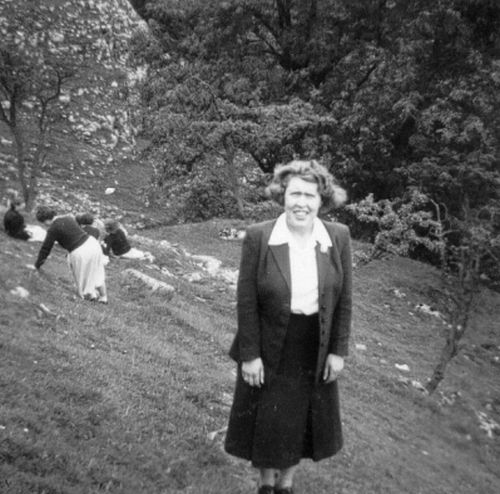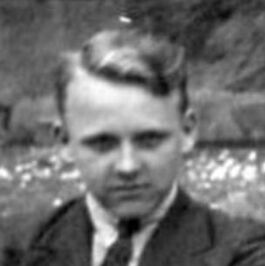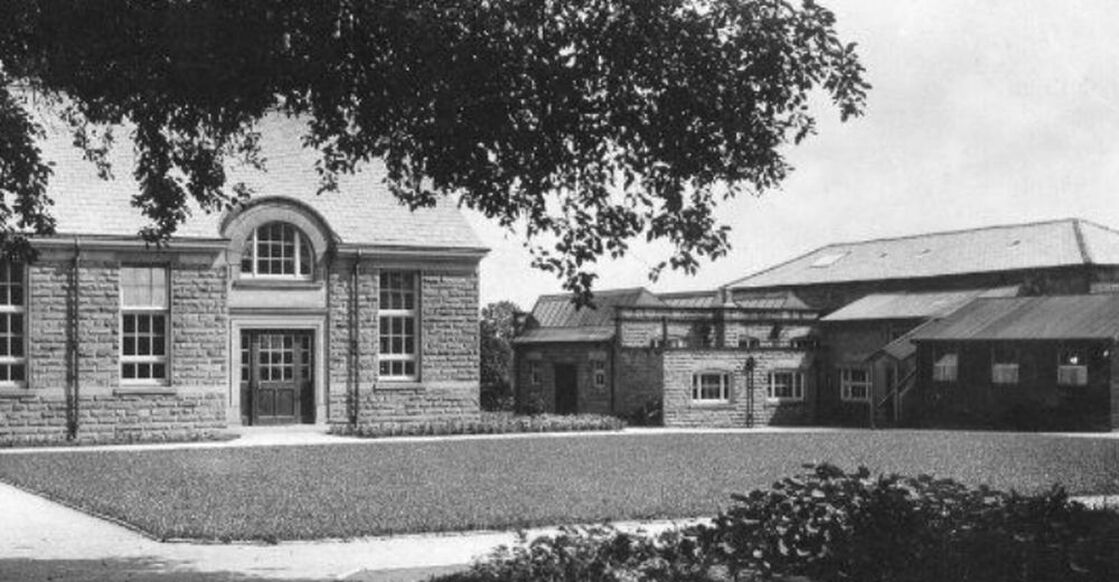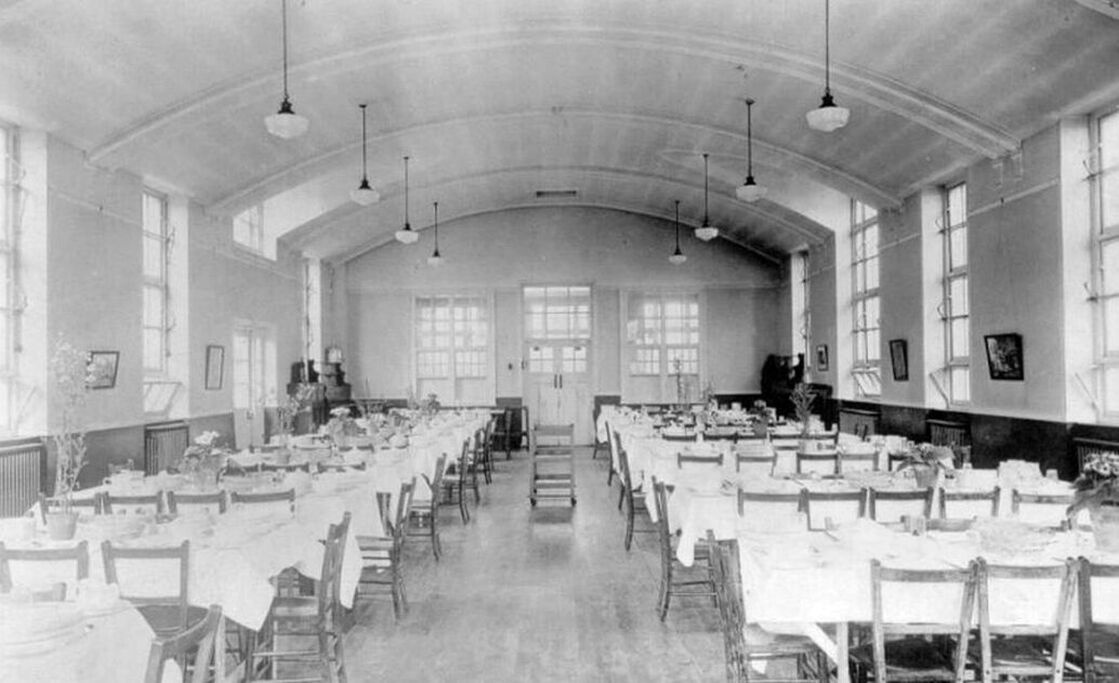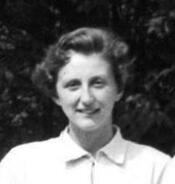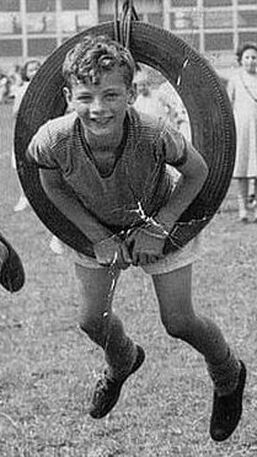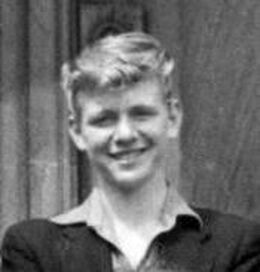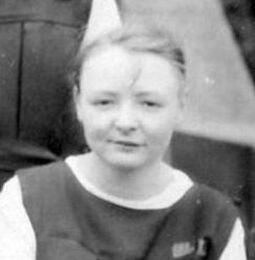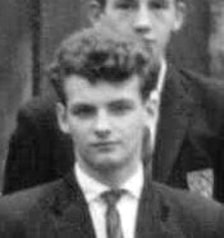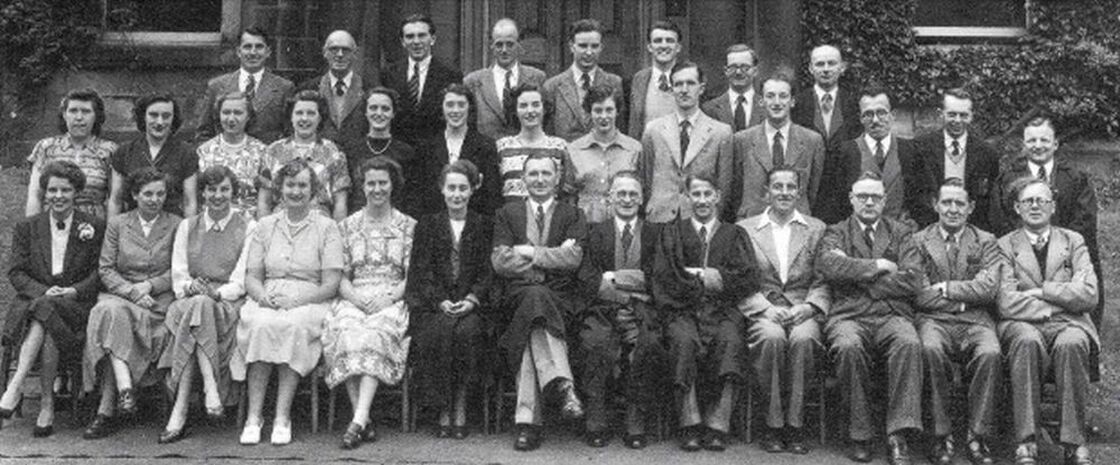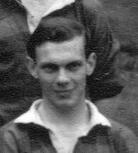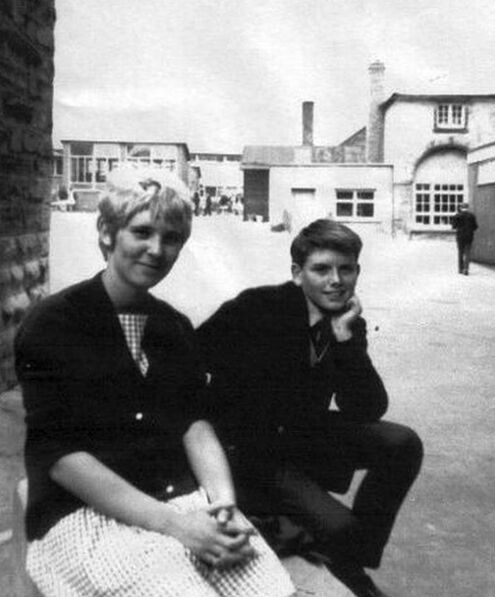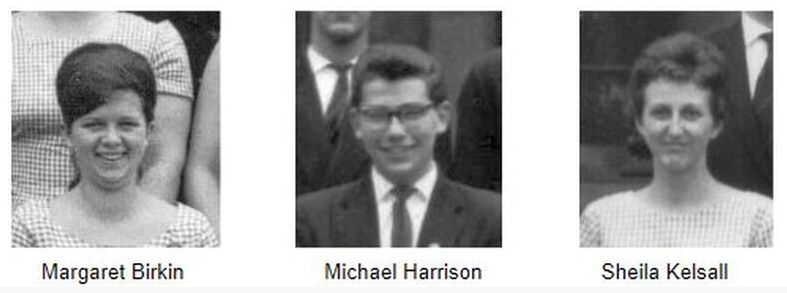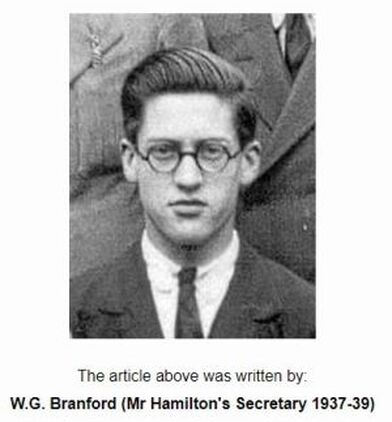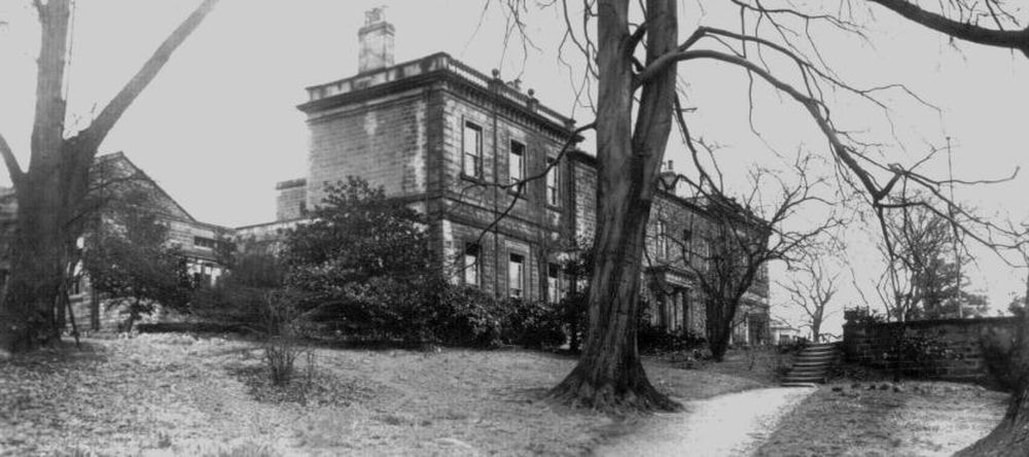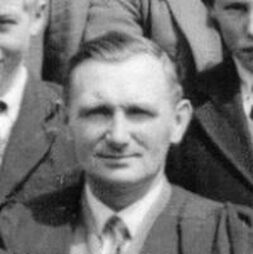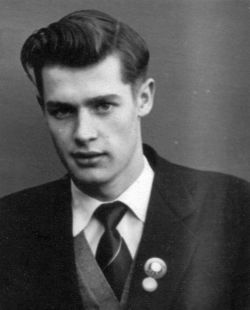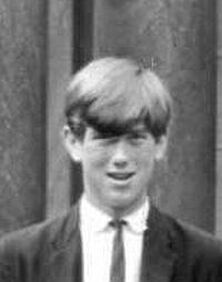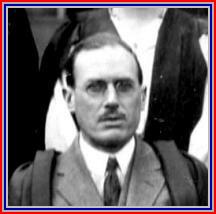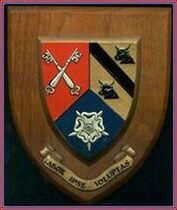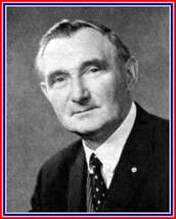Posts about Hemsworth Grammar School 1
Updated 27.05.2023
Updated 27.05.2023
Miss Ward on a Geography Fieldtrip in 1954
|
Table of Contents
1. School Dinners 2. 1955: In the beginning 3. HSS was a very important place in 1922 4. A long time ago 5. Before the 1967 changes |
6. The Mr. Hamilton interview extract 1, Year 1961-62
7. A Reflection 8. Hemsworth Secondary School and wireless technology 1923 9. The Mr. Hamilton Interview extract 2, Year 1961-62 10. From a former HGS pupil and later the Headmaster of King's School, Pontefract. |
1. School Dinners
Eric Jones
I can still remember my first school dinner at HGS. The pudding was apple dumpling which as I recall never appeared on the menu again all the time I was there. As one entered the Dining Hall, the girls were on the right and the boy’s were on the left with the first table on the right being Staff. Each table was headed by a Prefect and seated 12-14 with 1st Form at the bottom acting as skivvies to clear away dishes and to scavenge for extra food if possible. There was an excess of boys over girls, so I remember being a skivvy on a girls’ table headed by Margaret Townend, whose photograph appears on the website. Main meals tended to be of the meat and two veg. type (quantity rather than quality) with Shepherds Pie well to the fore. Puddings were of the following variety: Wooden Leg - baked jam roll - a popular favourite and scivvies were guaranteed the Knob end - all pastry and no jam; Spotted Dick - Sultana Sponge; Jelly and Custard in summer; Frog Spawn - sago; and always rice pudding. Custard was eaten at one’s peril and regularly we had the infamous Black Death - stewed prunes.
As I remember the school record for eating prunes was 41, by a lad from Grimethorpe called Johnny Orange. The skivvies were bringing in prunes from all over the room when he went for the record - I cannot recall it being broken while I was there. The Staff menu was much better than ours and when their trolley trundled from the kitchen to their table, it was like a scene from Oliver. As First Formers, we were amazed at the amount of food Mr Waters, Maths Teacher, was able to get onto his fork! There was a twist to school dinners in that you could take your own if you wished. These were consumed in the Domestic Science room at the end of the corridor next to the Main Hall. Crockery was supplied from the main Dining Hall. It was a Prefect’s job to collect and return a basketful of this every day. I had a spell of about a year doing my own food and I remember that dried egg sandwiches figured prominently. As a Prefect, I finally graduated to having a table of my own in the Dining Hall, but the only skivvy I can remember was a cheeky young First Former by the name of Eric Sale. To be fair, the kitchen staff worked miracles really, especially as things became in short supply towards the end of the war and the early years of peace. If I remember correctly, the head cook was Mrs. Cliffe who was the wife of the School Caretaker.
Eric Jones, HGS 1942-49
I can still remember my first school dinner at HGS. The pudding was apple dumpling which as I recall never appeared on the menu again all the time I was there. As one entered the Dining Hall, the girls were on the right and the boy’s were on the left with the first table on the right being Staff. Each table was headed by a Prefect and seated 12-14 with 1st Form at the bottom acting as skivvies to clear away dishes and to scavenge for extra food if possible. There was an excess of boys over girls, so I remember being a skivvy on a girls’ table headed by Margaret Townend, whose photograph appears on the website. Main meals tended to be of the meat and two veg. type (quantity rather than quality) with Shepherds Pie well to the fore. Puddings were of the following variety: Wooden Leg - baked jam roll - a popular favourite and scivvies were guaranteed the Knob end - all pastry and no jam; Spotted Dick - Sultana Sponge; Jelly and Custard in summer; Frog Spawn - sago; and always rice pudding. Custard was eaten at one’s peril and regularly we had the infamous Black Death - stewed prunes.
As I remember the school record for eating prunes was 41, by a lad from Grimethorpe called Johnny Orange. The skivvies were bringing in prunes from all over the room when he went for the record - I cannot recall it being broken while I was there. The Staff menu was much better than ours and when their trolley trundled from the kitchen to their table, it was like a scene from Oliver. As First Formers, we were amazed at the amount of food Mr Waters, Maths Teacher, was able to get onto his fork! There was a twist to school dinners in that you could take your own if you wished. These were consumed in the Domestic Science room at the end of the corridor next to the Main Hall. Crockery was supplied from the main Dining Hall. It was a Prefect’s job to collect and return a basketful of this every day. I had a spell of about a year doing my own food and I remember that dried egg sandwiches figured prominently. As a Prefect, I finally graduated to having a table of my own in the Dining Hall, but the only skivvy I can remember was a cheeky young First Former by the name of Eric Sale. To be fair, the kitchen staff worked miracles really, especially as things became in short supply towards the end of the war and the early years of peace. If I remember correctly, the head cook was Mrs. Cliffe who was the wife of the School Caretaker.
Eric Jones, HGS 1942-49
The HGS Dining Hall
The HGS Dining Room in 1939
Further notes from Sheila Kelsall
These are the memories which come to mind when dinners are mentioned. On Monday morning breaks we had to go and buy our Dinner Tickets for the week. Usually two half-crowns would be the cost, as the tickets were one shilling each for the 5 days. The grey rectangular tickets were on a roll, and dispensed by a prefect who put our money in a tin and dispensed change where necessary. After we had queued in all weathers outside the Dining Hall, we went up the steps, through the doors and turned right to encounter a table set at an angle in the corner. This is where we parted with our tickets by tossing them onto the table manned by a prefect. The longer everyone had to wait for entry, the more dirty, curled, folded, and generally tatty was the ticket. The First sitting was usually for the younger end of the school, and maybe entry was by forms. Continuing down the long side of the building, we approached the kitchen end of the Hall. Trestle tables were arranged in front of the entrance to the kitchen, and word had already travelled to us while we were outside as to what was on the menu. Fridays we knew would bring fish, but never chips. The nearest we came to chips was when the offering was roasted parsnips as a vegetable. They really looked like chips! A trolley on wheels with a middle shelf held a stack of dinner plates, and having chosen one, we progressed along the line of dinner ladies wielding ladles, large spoons and a huge aluminium jug of gravy.
Those ladies were jolly sorts, with rosy cheeks and grey, permed hair peeking out of their white starched caps. They said things like - “did you know there are 23 eggs in that custard?” or, “eat your carrots and you’ll be able to see in the dark”. The Catering Supervisor was a very youthful looking lady compared with her staff, and we had no idea of the way she had to figure out how to present nutritional meals on a budget. All we knew were our own likes and dislikes. Liver and onions, Steak Pie, Minced meat in gravy, Baked fish, “Frog Spawn” - Sago Pudding. Semolina with a dash of strawberry jam. Manchester Tart - a pastry base, then jam, then sponge, and served with custard. Everyone would be able to add to this as their memories select. The first incomers would then walk back down the far side of the Hall carrying a full plate, and occupy the first long tables by the door, which ran width ways across the room. By the time the room was full, those who came last did not have far to walk to their seats. We stayed in line, sat, ate, and went line by line for seconds, or for the next course. Our exit was made in the opposite direction towards a trolley in the opposite corner to the ticket table. Slow eaters sometimes gave up rather than bear the silent gazes of everyone eager to get out and play, as the whole line of about 20 children could only be dismissed when all had finished. After a short clearing away procedure, the whole proceedings were repeated in the Second Sitting.
There was usually a member of staff on duty, exhibiting varying degrees of interest in the proceedings. I remember Mr Leonard rapping on a table for attention, and announcing that he was disgusted at the way some people were lacking table manners. He held up a fork, and turned it curved side upwards, to show how we should use it. He did not want to see anyone “shovelling” food into their mouths. There was always an effort to keep the noise levels down. We never saw the washing-up, nor the preparation of the food. First-formers might hear a bit of clattering as the serving trays and containers were moved around, and of course they received the first aromas of cooking cauliflower or baked fish, being so near to the Dining Hall, but generally we acted as consumers pure and simple. There were a few pupils who went home for dinner, but they missed so much!
Sheila Kelsall, HGS 1955-62
Those ladies were jolly sorts, with rosy cheeks and grey, permed hair peeking out of their white starched caps. They said things like - “did you know there are 23 eggs in that custard?” or, “eat your carrots and you’ll be able to see in the dark”. The Catering Supervisor was a very youthful looking lady compared with her staff, and we had no idea of the way she had to figure out how to present nutritional meals on a budget. All we knew were our own likes and dislikes. Liver and onions, Steak Pie, Minced meat in gravy, Baked fish, “Frog Spawn” - Sago Pudding. Semolina with a dash of strawberry jam. Manchester Tart - a pastry base, then jam, then sponge, and served with custard. Everyone would be able to add to this as their memories select. The first incomers would then walk back down the far side of the Hall carrying a full plate, and occupy the first long tables by the door, which ran width ways across the room. By the time the room was full, those who came last did not have far to walk to their seats. We stayed in line, sat, ate, and went line by line for seconds, or for the next course. Our exit was made in the opposite direction towards a trolley in the opposite corner to the ticket table. Slow eaters sometimes gave up rather than bear the silent gazes of everyone eager to get out and play, as the whole line of about 20 children could only be dismissed when all had finished. After a short clearing away procedure, the whole proceedings were repeated in the Second Sitting.
There was usually a member of staff on duty, exhibiting varying degrees of interest in the proceedings. I remember Mr Leonard rapping on a table for attention, and announcing that he was disgusted at the way some people were lacking table manners. He held up a fork, and turned it curved side upwards, to show how we should use it. He did not want to see anyone “shovelling” food into their mouths. There was always an effort to keep the noise levels down. We never saw the washing-up, nor the preparation of the food. First-formers might hear a bit of clattering as the serving trays and containers were moved around, and of course they received the first aromas of cooking cauliflower or baked fish, being so near to the Dining Hall, but generally we acted as consumers pure and simple. There were a few pupils who went home for dinner, but they missed so much!
Sheila Kelsall, HGS 1955-62
2. 1955: In the beginning
Dave at the Harewood Lane Junior School (Upton) Sports Day
I was in our kitchen one day in 1955 when my dad opened the letter which offered me a grammar school place. I had a choice of Hemsworth Grammar School or Kings School, Pontefract. I had never heard of either! I was not well informed about anything at that time as I was too busy making stay-up kites, trollies (with steering and suspension), dens, dirt-tracking on my brother's Raleigh in Walton Wood, playing football and cricket &c. In fact I did not know that I had taken my 11+ examination. To me it was just a test that I had to take before I went out to play on the back field or around the War Memorial. I had obviously passed the exam. My dad told me about the two schools. He said that Kings was "boys only" and that Hemsworth "was boys and girls". I had to make a choice, so I said Hemsworth as "boys and girls" sounded more like the junior school in Upton. That was it! No great thought about the choice at all. I had no idea that I would attend that school for the next seven years.
So 1955-56 became my first year at HGS, and on Wednesday 9th November 1955 I went to my first Speech Day at the Hippodrome. I was amazed at the colour, the large audience, the professionalism and the good behaviour shown during the afternoon. I felt very small and certainly not part of what I was witnessing. The winners had been at the school for a long time - me, just a few weeks. In those few weeks I had gone from being a carefree junior school pupil to an HGS pupil in 1C who was under some pressure. The questions and doubts were beginning to form! My personal tasks at this time were really observation, the development of personal discipline and the general adjustment to secondary education as it was delivered in this Grammar School. Overall, my most important aim was to stay out of trouble. The Headmaster, a remote person to me at that time, had a cane! This frightened me. I was to follow this aim throughout my HGS career. I was a "goody two shoes". I remember that Mr Leonard, our P.E. and Geography teacher in 1C stood at the front of the class in Room 23 one day and spoke to us about our present HGS opportunity. We should make the most of it and not waste it. He said that there were many boys and girls in the area that would love to come to this school in our place. That remark obviously hit home.
Dave
So 1955-56 became my first year at HGS, and on Wednesday 9th November 1955 I went to my first Speech Day at the Hippodrome. I was amazed at the colour, the large audience, the professionalism and the good behaviour shown during the afternoon. I felt very small and certainly not part of what I was witnessing. The winners had been at the school for a long time - me, just a few weeks. In those few weeks I had gone from being a carefree junior school pupil to an HGS pupil in 1C who was under some pressure. The questions and doubts were beginning to form! My personal tasks at this time were really observation, the development of personal discipline and the general adjustment to secondary education as it was delivered in this Grammar School. Overall, my most important aim was to stay out of trouble. The Headmaster, a remote person to me at that time, had a cane! This frightened me. I was to follow this aim throughout my HGS career. I was a "goody two shoes". I remember that Mr Leonard, our P.E. and Geography teacher in 1C stood at the front of the class in Room 23 one day and spoke to us about our present HGS opportunity. We should make the most of it and not waste it. He said that there were many boys and girls in the area that would love to come to this school in our place. That remark obviously hit home.
Dave
Keith Twigg
This brings back memories. I started at HGS on the same day as you, David and it is still etched in my mind. It was such a massive place compared to Broad Lane Juniors at South Elmsall and I can still remember with clarity the walk from the green gate up to the playground and being confronted by what seemed thousands of people.
This brings back memories. I started at HGS on the same day as you, David and it is still etched in my mind. It was such a massive place compared to Broad Lane Juniors at South Elmsall and I can still remember with clarity the walk from the green gate up to the playground and being confronted by what seemed thousands of people.
3. HSS was a very important place in 1922
"Pupils came to our school from all the surrounding villages: South Hiendley, Brierley, Shafton, Grimethorpe, South Kirkby, South Elmsall, Upton, Ackworth, Nostell and Badsworth. There were very few buses and pupils walked from Hiendley and Brierley every day staying at school for their midday meal. The children from South Elmsall came by train to Hemsworth Station and entered the school grounds from the Station Road end. They also stayed for dinner. The local pupils went home for their midday meal.
This new school was a God-send for the district. It provided opportunities for children who would have otherwise been denied. The cost for fee paying pupils was 2 guineas per term, rising later to 3 guineas. This enabled my parents to send more of the family as soon as they were old enough. At one time, I think there were five sisters, including me, from our family attending the Hemsworth Secondary School."
Marion Finch
This new school was a God-send for the district. It provided opportunities for children who would have otherwise been denied. The cost for fee paying pupils was 2 guineas per term, rising later to 3 guineas. This enabled my parents to send more of the family as soon as they were old enough. At one time, I think there were five sisters, including me, from our family attending the Hemsworth Secondary School."
Marion Finch
4. A long time ago
Dave (1961)
In 1950-51, Rationing was still in force and I clearly remember the Ration Books for foodstuffs. We did not have a car in the Forties, but in the early Fifties we acquired a black Humber from a farmer. We could not use it very much as Petrol Rationing was in force. On Harewood Lane in Upton, cars were parked at the rear of the houses and were rarely moved as the owners could not get fuel. To tax the car we had to go into Wakefield St. John's North and queue up.
Our back garden was given over to the growing of potatoes. My father would work at Upton Pit, have a rest and then spend some time working on the potatoes. Sometimes he would "get the coal in" from the pavement. This meant a lot of shovelling and then barrowing it to the Coal House where it was stacked. Chopping sticks for the fires was also one of his jobs. He would "make the fires" every morning so we could have heat and hot water. We purchased a 12 inch TV for the Coronation in 1953. Lots of neighbours packed into our living room to watch the ceremony.
I joined the School as a pupil in 1955 and thirteen of this group of teachers taught me at one time or another. I am forever grateful to them. This new decade promised so much after the dark days of World War 2. There was happiness and humour among the Staff which had developed so soon after the end of hostilities.
Our back garden was given over to the growing of potatoes. My father would work at Upton Pit, have a rest and then spend some time working on the potatoes. Sometimes he would "get the coal in" from the pavement. This meant a lot of shovelling and then barrowing it to the Coal House where it was stacked. Chopping sticks for the fires was also one of his jobs. He would "make the fires" every morning so we could have heat and hot water. We purchased a 12 inch TV for the Coronation in 1953. Lots of neighbours packed into our living room to watch the ceremony.
I joined the School as a pupil in 1955 and thirteen of this group of teachers taught me at one time or another. I am forever grateful to them. This new decade promised so much after the dark days of World War 2. There was happiness and humour among the Staff which had developed so soon after the end of hostilities.
The Teaching Staff 1950-51
Back Row L-R: Mr. Allan, Mr. Lock, Mr. Taylor, Mr. Senior, Mr. Owen, Mr. Dodd, Mr. Combs, Mr. Revill
Second Row L-R: Miss. Ward, Miss. Austin, Miss. Corfe, Miss. Wimpenny, Mrs. Owen, Miss. Saville, Miss. McBride, Sheila Close (Sec.), Mr. Farrar, Mr. Young, Mr. Walker, Mr. Burnett, Mr. Swinbank
Front Row L-R: Miss. Horsfield, Miss. Metcalfe, Miss. Whitworth, Miss. Carter, Miss. Harris, Miss. Smith, Mr. Hamilton, Mr. Collette, Mr. Manning, Mr. Leonard, Mr. Atack, Mr. Foy, Mr. Lloyd
Second Row L-R: Miss. Ward, Miss. Austin, Miss. Corfe, Miss. Wimpenny, Mrs. Owen, Miss. Saville, Miss. McBride, Sheila Close (Sec.), Mr. Farrar, Mr. Young, Mr. Walker, Mr. Burnett, Mr. Swinbank
Front Row L-R: Miss. Horsfield, Miss. Metcalfe, Miss. Whitworth, Miss. Carter, Miss. Harris, Miss. Smith, Mr. Hamilton, Mr. Collette, Mr. Manning, Mr. Leonard, Mr. Atack, Mr. Foy, Mr. Lloyd
Terry McCroakam
Happy days. Looking back, I wonder if any of the men fought in the war. I remember Cyril Dodd running a judo club one day a week after school. Where did he learn that I have often thought.
Happy days. Looking back, I wonder if any of the men fought in the war. I remember Cyril Dodd running a judo club one day a week after school. Where did he learn that I have often thought.
Margaret Alison Croucher
We were always led to understand that Mr. Swinbank had been on an anti-aircraft battery during the war.
We were always led to understand that Mr. Swinbank had been on an anti-aircraft battery during the war.
5. Before the 1967 changes
A classic, well-known view to me and to so many others. There were daily breaks and lunch-times spent in this area. I will always remember this "before the changes" view. The most modern building was the Science Block which I remember almost from the time it started to be built. I would chat to Bernard Logan (Upton), one of the construction workers, almost every day. Touch and pass on the playground was a regular informal game before going to "Double Maths". Not my most "darling" of subjects, but Mr. Pacy got me through!
Photo from Marrion Pearson. Thank you, Marrion.
Photo from Marrion Pearson. Thank you, Marrion.
6. An extract from an interview with Mr. Hamilton in School Year 1961-62
"Fate"
To mark his twenty-fifth year at Hemsworth Grammar School, the Headmaster was interviewed towards the end of the Spring Term. The tape-recorded interview contained much more material than space permits to be reproduced; it has therefore been edited and the more important extracts are printed below. Our grateful thanks are due to Mr. Hamilton for allowing us time for the interview and for giving us permission to print his opinions. They should be of particular interest to junior members of the School who have not yet had the opportunity of meeting Mr. Hamilton outside the academic sphere.
"Fate"
To mark his twenty-fifth year at Hemsworth Grammar School, the Headmaster was interviewed towards the end of the Spring Term. The tape-recorded interview contained much more material than space permits to be reproduced; it has therefore been edited and the more important extracts are printed below. Our grateful thanks are due to Mr. Hamilton for allowing us time for the interview and for giving us permission to print his opinions. They should be of particular interest to junior members of the School who have not yet had the opportunity of meeting Mr. Hamilton outside the academic sphere.
Q. Why did you choose to come to this area?
A. "I didn't choose to come to Hemsworth Grammar School - Fate directed me here. I had been head of my own department for five or six years, and the only prospect of promotion was to apply for a headmastership. I applied for every vacancy that looked at all reasonable, and Hemsworth was just one of them. When I was told by my headmaster that enquiries were being made about me at a place called Hemsworth, I had to admit that I just did not know where it was. My being here is the work of Fate rather than my own choice."
Those present at the interview were:
Margaret Birkin (Head Girl of HGS in 1962-63), Michael Harrison and Sheila Kelsall.
A. "I didn't choose to come to Hemsworth Grammar School - Fate directed me here. I had been head of my own department for five or six years, and the only prospect of promotion was to apply for a headmastership. I applied for every vacancy that looked at all reasonable, and Hemsworth was just one of them. When I was told by my headmaster that enquiries were being made about me at a place called Hemsworth, I had to admit that I just did not know where it was. My being here is the work of Fate rather than my own choice."
Those present at the interview were:
Margaret Birkin (Head Girl of HGS in 1962-63), Michael Harrison and Sheila Kelsall.
Sheila writes:
"I can't remember why I was invited to sit in on this interview, perhaps it was to take notes or to operate the tape recorder. It was the only time I ever went into the Head's Study. Mr. Hamilton sat at his desk and Mick Harrison, Margaret Birkin and I were on the other side with our backs to the door. There may even have been others there too. Mick and Margaret took turns in asking the questions."
"I can't remember why I was invited to sit in on this interview, perhaps it was to take notes or to operate the tape recorder. It was the only time I ever went into the Head's Study. Mr. Hamilton sat at his desk and Mick Harrison, Margaret Birkin and I were on the other side with our backs to the door. There may even have been others there too. Mick and Margaret took turns in asking the questions."
7. A reflection
Looking back after over half a century that which one recalls most vividly about Russell Hamilton was his penetrating gaze, his almost piercing examination of the face of whoever was in conversation with him, be he or she a member of staff, a pupil or his own Secretary. Permanently he had an air of quiet, calm authority yet one knew that when he spoke it would be with a kindly voice whether in reply to a point raised or in giving his next instruction. It was this kindness and understanding that enabled me to write my shorthand in my notebook knowing that he would rarely begin the next sentence until he had seen me write each Pitman full stop. A classical scholar of his learning and eminence could have dictated his letters or his annual report for Speech Day at a much greater speed than my 80/90 words per minute. It is safe to say that when I was addressing Headmasters' Conferences north of the border in the 1970s, I did not have Thomas Arnold of Rugby nor F.W. Sanderson of Oundle nor Edward Thring of Uppingham in mind. I am sure I based my ideas of great headmastership on Arthur Jenkinson and his successor, Russell W. Hamilton, M.A., M.Litt. (Durham).
With the death of Russell Hamilton in Exmouth in November 1993 yet another chapter has closed.
(Written 4th January 1994)
8. Hemsworth Secondary School and wireless technology 1923
HSS was a "with it" school back in the day.
Wireless Club 1923 (Radio Society)
Few of us are quite indifferent to the romance of this the latest wonder of science. To be able to hear musicians and speakers performing hundreds of miles away must grip the imagination especially when one considers the insignificant looking wire stretched overhead and the somewhat mysterious array of little boxes that work the 'phones. The fascination has gripped the members of the School Wireless Club. Most of them have proved their keenness by writing essays, and good essays too, when one considers the difficulty of the subject.
Below is a list of the names arranged in order of merit:
F. Swaine. Barker
L. Dykes. Bull
E. Thorley. Slatcher
M. Hodgson. Hawkesworth
K. Jagger.
From purchased parts the Club has built up five “units". Each unit has a special work to do and is contained in a separate case. Each unit was put into the care of two or three enthusiasts who, except in the cases of special difficulty, did the whole of the construction themselves. Unit “three” in the hands of Bull and Carter gave the least trouble and was completed within ten days of starting. Others were rather difficult to fit and involved many hours of work. At the time of writing we are waiting for a wrong battery to be exchanged, and then will come that exciting moment when we make our first attempt to pick up signals from the ether, and so prove that our work has been good. A period of adjusting the apparatus will doubtless follow, but before these notes are published we hope to get into full working order. Further developments include some simple wireless experiments for the experts (shall we ever “get” America?) and the fitting of a loud speaker which will make it possible for many more to “listen in".
Wireless Club 1923 (Radio Society)
Few of us are quite indifferent to the romance of this the latest wonder of science. To be able to hear musicians and speakers performing hundreds of miles away must grip the imagination especially when one considers the insignificant looking wire stretched overhead and the somewhat mysterious array of little boxes that work the 'phones. The fascination has gripped the members of the School Wireless Club. Most of them have proved their keenness by writing essays, and good essays too, when one considers the difficulty of the subject.
Below is a list of the names arranged in order of merit:
F. Swaine. Barker
L. Dykes. Bull
E. Thorley. Slatcher
M. Hodgson. Hawkesworth
K. Jagger.
From purchased parts the Club has built up five “units". Each unit has a special work to do and is contained in a separate case. Each unit was put into the care of two or three enthusiasts who, except in the cases of special difficulty, did the whole of the construction themselves. Unit “three” in the hands of Bull and Carter gave the least trouble and was completed within ten days of starting. Others were rather difficult to fit and involved many hours of work. At the time of writing we are waiting for a wrong battery to be exchanged, and then will come that exciting moment when we make our first attempt to pick up signals from the ether, and so prove that our work has been good. A period of adjusting the apparatus will doubtless follow, but before these notes are published we hope to get into full working order. Further developments include some simple wireless experiments for the experts (shall we ever “get” America?) and the fitting of a loud speaker which will make it possible for many more to “listen in".
9. The Mr. Hamilton Interview in School Year 1961-62
Pupil changes 1937-62
Pupil changes 1937-62
Mr. Hamilton
To mark his twenty-fifth year at Hemsworth Grammar School, the Headmaster was interviewed towards the end of the Spring Term. The tape-recorded interview contained much more material than space permits to be reproduced; it has therefore been edited and the more important extracts are printed below. Our grateful thanks are due to Mr. Hamilton for allowing us time for the interview and for giving us permission to print his opinions. They should be of particular interest to junior members of the School who have not yet had the opportunity of meeting Mr. Hamilton outside the academic sphere
Q. What are the main changes that you have seen in pupils over the last twenty-five years?
A. "Whatever changes have taken place have happened to all young people over that period. We are taking twice as many pupils now as we did in 1937 (Mr. Hamilton's first year as HGS Headmaster). That means that from an academic point of view we are admitting some who are not as quick as even the poorest we used to take in earlier years. We accept people who require six years to reach 'O' level, whereas twenty-five years ago those people did not come to a Grammar School at all. Another consequence of taking in such a large number of pupils is that it is not so easy these days to know every child in the School, whereas when I first came to HGS I knew practically every pupil."
A. "Whatever changes have taken place have happened to all young people over that period. We are taking twice as many pupils now as we did in 1937 (Mr. Hamilton's first year as HGS Headmaster). That means that from an academic point of view we are admitting some who are not as quick as even the poorest we used to take in earlier years. We accept people who require six years to reach 'O' level, whereas twenty-five years ago those people did not come to a Grammar School at all. Another consequence of taking in such a large number of pupils is that it is not so easy these days to know every child in the School, whereas when I first came to HGS I knew practically every pupil."
10. From Sid Kenningham, a former HGS pupil and later the Headmaster of King's School, Pontefract.
"H.G.S. may not have been the best ‘academic institution’, but it turned out some great ‘characters’, who subsequently made their respective ways in the world. Many of us had a great deal for which to thank the staff of H.G.S. who helped to shape our values and develop our personalities - and none more so than the revered R.W. Hamilton, who did his utmost to bring ‘pride’ and ‘standing’ to the school. Indeed, the verses of the ‘School Song’ encapsulated both his personal and educational philosophies; that you get out of life, what you are prepared to put into it."
I would like to say "Thank you" to Sid. Many years ago (early 1960s) I was at Brierley-Grimethorpe Secondary Modern having failed to pass (?) the 11+ examination. Sid was on the teaching staff and taught me, and possibly rekindled my interest in learning. He also introduced me (and the school) to the game of Rugby Union. I was subsequently transferred to HGS in 1964 and gained O and A levels in several subjects including Geography. I eventually finished up with a Degree in Geography and a Post Grad in Town Planning. I put these "achievements" down in part to Sid's influence back in the early 60s. Despite these I was made redundant in 1992 when the Local Authority I worked for was abolished. A change in career was called for so my wife and I downsized, bought a small farm in North Cumbria, and lived the "Good Life". Many thanks once again Sid - it could have been a whole lot different without you.
John Thorpe
John Thorpe
